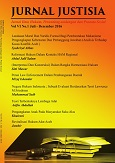Palestine in International Law Perspective
DOI:
https://doi.org/10.22373/justisia.v1i1.2560Abstract
The purpose of this research is to determine whether the state of Palestine has met the criteria as a sovereign state or not according to international law perspective. To answer this question, it will be used two theories related to the establishment of statehood, namely; constitutive theory and declarative theory. The constitutive theory stresses that a nation or government may become the subject of the international law if other nations acknowledge them as a state. While the declarative theory emphasizes that a nation can only be classified as statehood if it fulfills the normative criteria as stipulated in the Montevideo Convention, these are; permanent population, a defined territory and government. After analyzed, it is found that Palestine has actually fulfilled the criteria or requirement as a sovereign state based on the two above theories. The state already has permanent population, a defined territory and effective government. Similarly, Palestine has been recognized by 136 countries out of 193 countries in the world. There is only political matter which makes superpower states such as the United States of America have not given yet the recognition to the Palestine. Due to superpower states, more less it will affect Palestine to gain more recognition from other countries. However, Palestine is a sovereign state now based on the international law perspective. The methodology used in this research is by collecting primary resources such as journals, books, the United Nations document and other several secondary resources, and then these are analyzed and come up with a conclusion. Key words: Palestine, Sovereignity, Perspective, International Law.References
Books/Articles/Reports
Andrew Edward, ‘Jean Bodin on Sovereignty’ (2011) 2(2) Republics of Letters 75-84
Christoforos Ioannidis, ‘Are the Conditions of Statehood Sufficient? An Argument in Favour of Popular Sovereignty as an Additional Condition of Statehood’ (2014) 21(4) Jurisprudencija
Clarke Ben, and Jackson Nyamuya Maogoto, International Law (Thomson Reuters, 2009)
Crawford James, ‘The Criteria for Statehood in International Law’ (1976) 48 (1) Oxford Journals 93-182
Halabi Usama, ‘The Legal Status of Palestinians in Jerusalem’ (1997) 4(1) Palestine-Israel Journal
Malcolm D Evans, International Law (Oxford University Press, 2014)
Website
https://echo360admin.canberra.edu.au
Downloads
Published
Issue
Section
License
The Authors submitting a manuscript do so on the understanding that if accepted for publication, copyright of the article shall be assigned to Jurnal Justisia : Jurnal Ilmu Hukum, Perundang-undangan dan Pranata Sosial, Ar-Raniry State Islamic University, Indonesia as the publisher of the journal.
Jurnal Justisia : Jurnal Ilmu Hukum, Perundang-undangan dan Pranata Sosial right of first publication with the work simultaneously licensed under Creative Commons Attribution-ShareAlike 4.0 International License (CC BY-SA 4.0) that allows others to share (copy and redistribute the material in any medium or format) and adapt (remix, transform, and build upon the material) the work for any purpose, even commercially with an acknowledgment of the work's authorship and initial publication in Jurnal Justisia : Jurnal Ilmu Hukum, Perundang-undangan dan Pranata Sosial. Authors are able to enter into separate, additional contractual arrangements for the non-exclusive distribution of the journal's published version of the work (e.g., post it to an institutional repository or publish it in a book), with an acknowledgment of its initial publication in Jurnal Justisia : Jurnal Ilmu Hukum, Perundang-undangan dan Pranata Sosial. Authors are permitted and encouraged to post their work online (e.g., in institutional repositories or on their website) prior to and during the submission process, as it can lead to productive exchanges, as well as earlier and greater citation of published work (See The Effect of Open Access).

